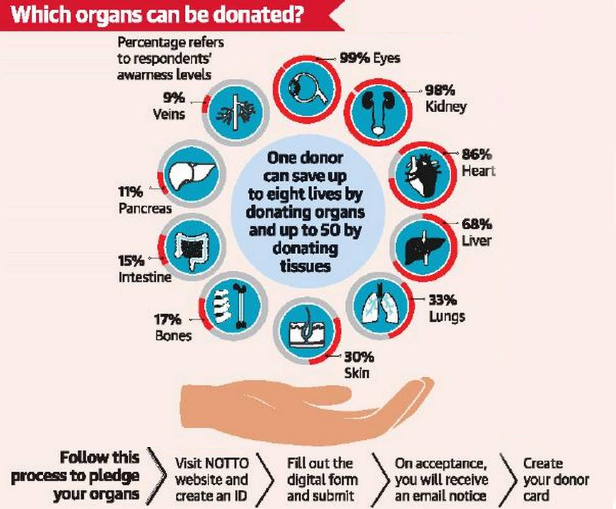Social Issues
Organ Donation in India
- 09 Aug 2023
- 7 min read
For Prelims: Transplantation of Human Organs Act, 1994, National Organ Transplantation Guidelines, Organ Donation
For Mains: Need for Promoting Organ Donations
Why in News?
Recently, the critical shortage of organ donations, particularly deceased donations, has led to a dire situation in India, with thousands of patients waiting for transplants and a significant number losing their lives daily.
- The Ministry of Health and Family Welfare has earlier modified National Organ Transplantation Guidelines, allowing those above 65 years of age to receive an organ for transplantation from deceased donors.
- In India, the Transplantation of Human Organs Act, 1994 provides various regulations for the removal of human organs and their storage. It also regulates the transplantation of human organs for therapeutic purposes and for the prevention of commercial dealings in human organs.
What is the Status of Organ Donation in India?
- Growing Demand and Persistent Shortage:
- Over 300,000 patients are on the waiting list for organ donations in India.
- The supply of organ donors has not kept up with the increasing demand.
- Approximately 20 individuals die daily while awaiting organ transplants due to the shortage.
- Slow Growth in Donor Numbers:
- Donor numbers, including both living and deceased, have shown slow growth over the years.
- From 6,916 donors in 2014, the count increased to about 16,041 in 2022, indicating a modest rise.
- The deceased organ donation rate in India has remained consistently below one donor per million population for a decade.
- Deceased Organ Donation Rate:
- Urgent efforts are required to raise the deceased organ donation rate to address the shortage.
- Countries like Spain and the United States have achieved significantly higher donation rates, ranging from 30 to 50 donors per million population.
- Prevalence of Living Donors:
- Living donors constitute the majority, accounting for 85% of all donors in India.
- However, deceased organ donations, especially for kidneys, liver, and heart, remain considerably low.
- Living donors constitute the majority, accounting for 85% of all donors in India.
- Regional Disparities:
- Disparities in organ donation rates exist among different states in India.
- Telangana, Tamil Nadu, Karnataka, Gujarat, and Maharashtra have reported the highest number of deceased organ donors.
- Delhi-NCR, Tamil Nadu, Kerala, Maharashtra, and West Bengal are prominent regions with a high number of living donors.
- Disparities in organ donation rates exist among different states in India.
- Kidney Transplants:
- Kidney transplantation in India faces a significant disparity between demand and supply.
- Annual demand for 200,000 kidney transplants is met with only around 10,000 transplants each year, creating a substantial gap.
What are the Challenges Regarding Organ Donation?
- Lack of Awareness and Education:
- Limited awareness among the general public about organ donation and its impact.
- Insufficient education among medical professionals to identify potential donors and counsel families effectively.
- Family Consent and Decision-Making:
- Family reluctance to give consent for organ donation, even when the deceased individual had expressed a willingness to donate.
- Emotional and ethical dilemmas that families face when making decisions about organ donation.
- Organ Trafficking and Black Market:
- Illegal organ trafficking and the existence of a black market for organs.
- Criminal activities exploiting the demand for organs and undermining legitimate donation processes.
- Medical Eligibility and Compatibility:
- Matching suitable donors and recipients based on medical compatibility and organ availability.
- Limited availability of compatible organs, leading to prolonged waiting periods for patients.
- Donor Incentives and Compensation:
- Debates over the ethical implications of offering financial incentives or compensation to organ donors.
- Balancing the need for increasing donation rates with ensuring ethical practices.
- Infrastructure and Logistics:
- Inadequate infrastructure and resources for organ retrieval, preservation, and transplantation.
- Challenges in the timely transportation of organs from donors to recipients, especially across different regions.
What are the Highlights of the New National Organ Transplantation Guidelines?
- Removed Age Cap:
- Age limit for organ recipients eliminated due to improved life expectancy.
- NOTTO (National Organ and Tissue Transplant Organization) guidelines previously prohibited end-stage organ failure patients above 65 years from registering for organ transplants.
- No Domicile Requirement:
- Domicile requirement waived for organ recipient registration.
- 'One Nation, One Policy' approach allows patients to register for organ transplants in any state.
- No Registration Fees:
- Removal of registration fees for organ recipient registration.
- States, including Gujarat, Telangana, Maharashtra, and Kerala, no longer charge fees for patient registration.
Note:
- NOTTO is set up under the Directorate General of Health Services, Ministry of Health and Family Welfare, located in New Delhi.
- National Network division of NOTTO functions as the apex centre for all Indian activities for procurement, distribution and registry of organs and tissues donation and transplantation in the country.
Way Forward
- Partner with artists, influencers, and celebrities to create impactful campaigns highlighting organ donation's significance.
- Organize seminars for medical professionals, employing interactive simulations and case studies for donor identification and family counseling.
- Collaborate with educational institutions to raise awareness among students about organ donation through workshops and talks.
- Host community-driven events that showcase the success stories of organ recipients and donors.
- Engage religious leaders to debunk myths and misconceptions about organ donation, emphasizing its compassionate aspect.
- Introduce a program to honour donors and their families, recognizing their selfless contribution through plaques and certificates.
- Foster collaborations between healthcare institutions to optimize organ transplantation processes for efficient outcomes.
- Promote the idea of organ donation as a selfless act of compassion and empathy.





